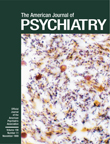d-Serine Added to Clozapine for the Treatment of Schizophrenia
Abstract
OBJECTIVE: d-Serine is a full agonist at the glycine site on the N-methyl-d-aspartate (NMDA) receptor. Previous administration of d-serine to schizophrenic patients taking nonclozapine antipsychotics improved positive, negative, and cognitive symptoms, whereas the partial agonist d-cycloserine improved negative symptoms of patients taking conventional antipsychotics but worsened symptoms in clozapine-treated patients. To study the difference between full and partial agonists at the NMDA receptor glycine site, the clinical effects of adding d-serine to clozapine were assessed. METHOD: In a 6-week double-blind trial, 20 schizophrenic patients received placebo or d-serine (30 mg/kg per day) in addition to clozapine. Clinical efficacy, side effects, and serum levels of d-serine were determined every other week. RESULTS: The patients exhibited no improvement with d-serine, nor did their symptoms worsen, as previously reported with d-cycloserine. CONCLUSIONS: The results suggest either that clozapine may have an agonistic effect on the NMDA system or that clozapine-treated patients do not respond to d-serine.



